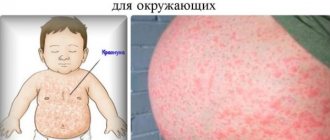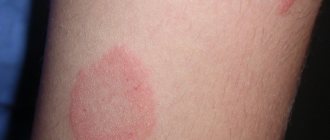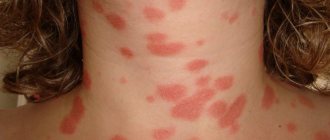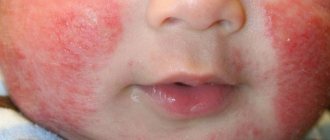All sorts of pathogenic microorganisms actively attack the human body. Among them there is one whose name is not familiar to many, although almost everyone has encountered it at least once in their lives.
This is one of the herpes viruses (type 4) - the Epstein-Barr virus. How dangerous is it and can it be overcome?
Read about what the Epstein-Barr virus is and how it is transmitted in the previous article.
Origin of the pathogen
The infectious agent belongs to the Herpesviridae family, contains DNA and is a type 4 herpes virus. Once in the human body, it provokes the development of infectious mononucleosis.
After the end of the acute form of the disease, some viral particles penetrate deeply into the tissue and hide from immune cells in the nerve ganglia or fibers.
The constant presence of the virus in the body forces the immune system to work harder, which gradually leads to the depletion of the defenses and disruption of their functioning.
In addition to infectious mononucleosis, herpes type 4 can also cause other diseases - lymphomas, multiple sclerosis, nasopharyngeal carcinoma, lymphogranulomatosis, hepatitis and Kikuchi disease.
Epstein-Barr virus-associated tumors
With a long-term chronic course of primary EBV infection, as well as against the background of immunodeficiency in other pathologies and conditions, the virus can lead to malignant neoplasms. Burkitt's lymphoma and nasopharyngeal cancer are most often diagnosed.
Lymphoma is described by an increase in temperature, the growth of a tumor in the area of the upper jaw, which grows into soft tissues and bones, metastasizing.
Nasopharyngeal carcinoma, like lymphoma, is most often described in southern countries. The tumor grows quite quickly, invades the nasal bone and skull bones, and metastasizes to the lymph nodes.
Spread of infection
Currently, the Epstein-Barr virus, like other herpes viruses, is widespread and ubiquitous.
Therefore, the question remains of how the Epstein-Barr virus is transmitted and whether it is contagious to other people. The source of the disease is always a sick person or a virus carrier (that is, herpes is transmitted from person to person).
Virions are found in all human biological fluids (for example, saliva, blood and urine). The main routes of transmission of the disease:
- contact (most often the virus is transmitted through close contact - kissing, sexual intercourse, or touching the affected areas);
- in a household way (when healthy and sick people use the same utensils, if personal hygiene rules are violated - one towel, razor, one washcloth, and so on);
- airborne droplets (when coughing, sneezing or talking);
- during transfusion of blood, plasma or any other components;
- when transplanting any organ (liver, kidneys, bone marrow);
- during pregnancy from a sick mother to the fetus;
- during childbirth when the baby passes through the birth canal (blood may get on the skin and mucous membranes of the newborn);
- while using non-sterile medical instruments;
- when drawing blood with low-quality syringes or using one syringe;
- tattoos, tattooing.
Very often, future parents are interested in whether herpes is inherited. Doctors answer that at the moment, hereditary transmission of the virus has not been proven.
However, if a pregnant woman becomes ill with infectious mononucleosis (or any other disease associated with type 4 herpes), this may affect the health of the fetus.
How does the virus behave once it enters the body?
- Once on the mucous membranes of the oral or nasal cavity, it penetrates the lymph nodes where it multiplies intensively. Then it is massively released into the general bloodstream.
- The virus attaches to lymphocytes, disrupting their reproduction, and their number increases significantly. At the same time, T-lymphocytes try to suppress this uncontrolled growth, an immune response occurs, clinically manifested by enlarged lymph nodes;
- If immune cells fail to contain the virus, then all organs are damaged, including the central nervous system. Those who suffer the most from this are HIV-infected people, who already have a low lymphocyte count;
- If a person has a good immune response, there will be no manifestations. This is explained by the fact that most people have immunity to other types of herpes. Although most cases of infection have a sign of mononucleosis. This clearly indicates the presence of this pathological element.
Manifestations in humans
After the virus enters the human body, it can be completely destroyed by the immune system, become a latent (hidden) carriage, or manifest itself as an acute or chronic infection. Upon initial exposure, type 4 herpes causes infectious mononucleosis. Clinical picture:
In addition to mononucleosis, the Epstein-Barr virus creates favorable conditions for the occurrence of cancer. For example, infected patients have an increased risk of developing Burkitt's lymphoma.
A little interesting about the virus itself
- EBV is so common that almost every child was exposed to it in childhood;
- Herpes Epstein Barr provokes sluggish chronic forms of many infectious pathologies;
- It can provoke the occurrence of diabetes mellitus. Moreover, it is not its action that has such an effect, but the possibility of the addition of other pathological flora;
- A new syndrome in medicine called chronic fatigue is also a consequence of the effects of EBV on the body.
Preventive actions
It is important to remember that the Epstein-Barr virus is contagious. It can lead to infection through several routes of transmission.
The disease develops in people with reduced immunity, so it is worth thinking about how to increase the activity of the immune system and maintain its functionality. Doctors highlight a number of general recommendations suitable for each person:
- observe personal hygiene rules (wash your hands and dry them thoroughly with dry wipes, have separate hygiene items, dry towels after use);
- eat rationally (more vegetables and fruits);
- lead an active lifestyle - take regular walks in the fresh air;
- to refuse from bad habits;
- treat major chronic diseases and prevent exacerbations;
- exercise;
- have one sexual partner;
- keep the house clean;
- avoid hypothermia.
All of the above tips reduce the risk of contracting the virus and reactivation of the disease in the virus carrier.
How does infectious mononucleosis manifest?
This disease most often affects children, because adults have already repeatedly encountered this virus. More often this happens during the first visit to a nursery or kindergarten, when the child first encounters EBV. Bar virus in adults tends to be reactivated rather than an acute manifestation.
- The period from introduction to the appearance of the first signs takes on average about two weeks. Symptoms similar to a viral infection appear.
- When virions enter the bloodstream, intoxication occurs, which lasts from several days to one month. The temperature is febrile with obvious toxic symptoms, headaches, weakness, malaise, and joint pain.
- Catarrhal symptoms appear due to the introduction of virions into the mucous membrane of the nose and oropharynx. All signs of a sore throat are noted, and sometimes fungal ulcers can be observed.
- Lymph nodes are enlarged until recovery. They increase in size in almost all groups, are small, dense, and painless on palpation.
- Hepato and splenomegaly. The liver is enlarged by several centimeters. Patients report indigestion, nausea, and aversion to food. Sometimes signs of obstruction of the biliary tract. The spleen enlarges significantly, which is accompanied by intense pain.
- Recovery occurs no earlier than three weeks. Immune cells managed to suppress reproduction. All symptoms gradually regress, organ functions return to normal. If another relapse occurs, it can last several years.
Therapeutic approaches
For treatment, various antiviral drugs (tablet or ointment forms), nonsteroidal anti-inflammatory drugs (symptomatic therapy), immunomodulators (vitamins and interferons), antipyretics, and analgesics are used.
Also, therapy includes strict bed rest, a gentle diet and plenty of fluids, and hospitalization in an infectious diseases hospital.
Herpes type 4 is a dangerous pathogen. It can cause not just one pathology, but a large number of dangerous diseases.
Therefore, it is worth paying attention to how herpes is transmitted and trying to prevent the body from becoming infected with the pathogen.
In addition, if you have any symptoms of the disease, you should immediately contact a doctor, who will conduct diagnostic measures and prescribe treatment.
Timely and appropriate therapy is a guarantee of successful completion of the infectious process and a person’s recovery.
Author: pediatrician Yatsenko Anton Andreevich
Diagnostics
Serological tests determine the presence of specific antibodies in the patient's blood.
Ig class M appears in the acute phase.
Ig class G indicates a period of recovery or a previous illness.
A positive result for the presence of antibodies is an increase in immunoglobulins above normal. Each laboratory has its own criterion, depending on the methodology and reagents; interpretation is carried out according to tables.
If there are any doubts about the results obtained, they must be retaken after a couple of weeks.
Prognosis and complications
EBV infection, as well as antibodies to the virus (IgG-VCA), remain in the body throughout life.
If treatment was provided on time, the prognosis for the acute form of the pathology is favorable.
With a weakened immune system and improper therapy, the following complications are possible:
- inflammation of the auditory analyzer;
- swelling of the throat;
- hemolytic anemia;
- liver problems;
- rupture of the spleen (in cases where the patient did not comply with bed rest and lifted heavy objects);
- inflammation of the pancreas;
- inflammation of the heart muscle.
The prognosis for the chronic form of the disease is ambiguous. It directly depends on the duration of the disease, complications and the presence of neoplasms.
The human immune system has all the necessary protective reactions against infections. Therefore, the best way to preserve your health and life is to create conditions for your body to effectively fight the virus.
Treatment
It is impossible to recover from viruses of the herpes family; it is only possible to eliminate the clinical manifestations and prevent the virus from actively multiplying. It can worsen when immunity decreases.
There is no specific therapy. Doctors around the world are looking for a medicine that will be able to overcome the virus and rid humanity of it forever.
In case of infectious mononucleosis, it is necessary to hospitalize the patient and treat him in a hospital. Only mild cases can be treated on an outpatient basis.
What measures are being taken:
- Reduced stress, bed rest;
- Increasing the amount of fluid consumed;
- Fractional balanced meals;
- Fried, spicy, salty, sweet, smoked foods are excluded;
- Be sure to include kefir and fermented baked milk in your diet;
- Be sure to remove any allergens, chocolate, honey, strawberries;
- Increase your intake of proteins, vitamins, micro and macro minerals.
For chronic fatigue, it is necessary to eat well, normalize sleep, and increase physical activity.
Prevention
It is very difficult to protect yourself from infection with the virus. But if you follow the recommendations for prevention, you can avoid the development of cancer and acute forms of pathology.
Prevention measures:
- You cannot use other people’s hygiene items and cosmetic products;
- you cannot practice unprotected sex and have a large number of sexual partners;
- lead a healthy lifestyle and quit smoking;
- avoid overwork and stress;
- exercise;
- sleep at least 8 hours a day;
- eat a balanced diet, minimizing the consumption of sweets, as well as spicy and salty foods;
- you need to take multivitamin and mineral complexes (especially in early spring).










